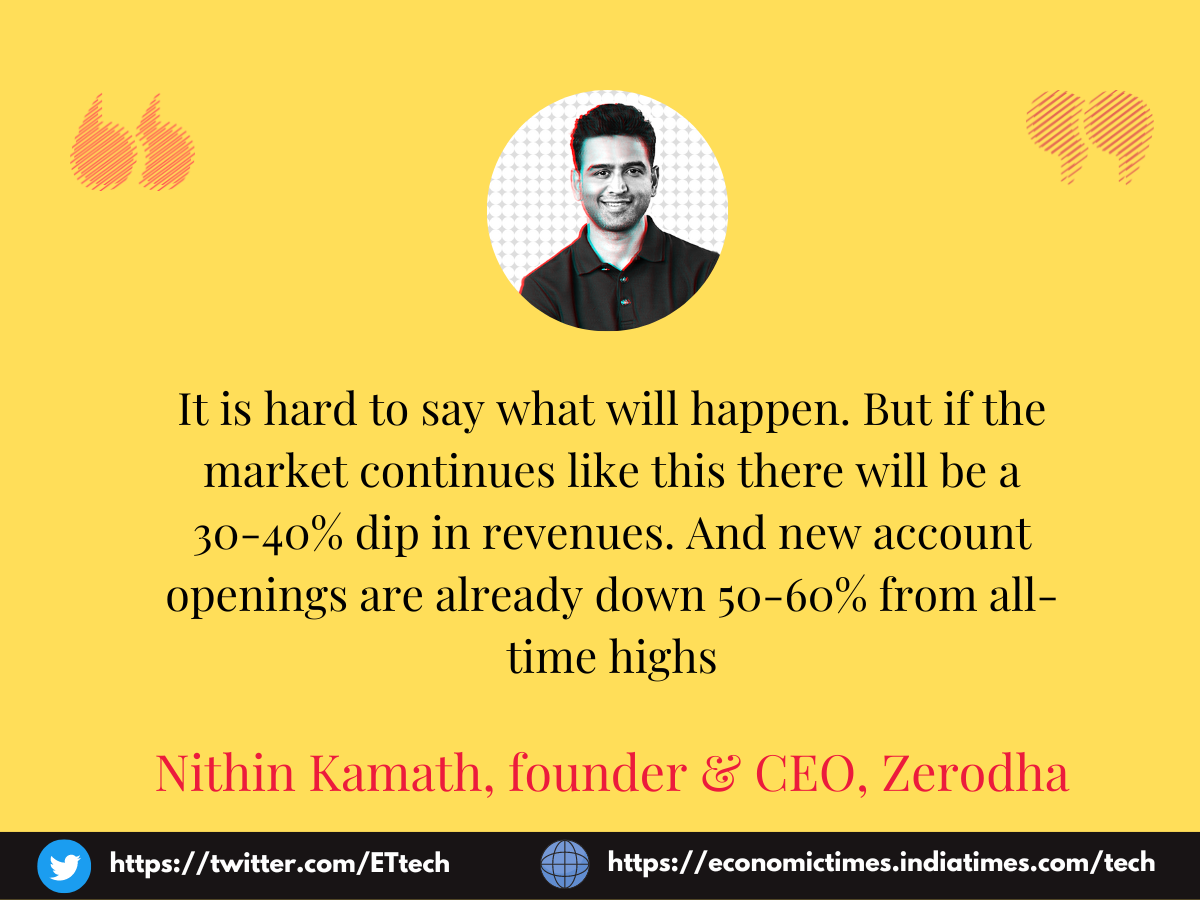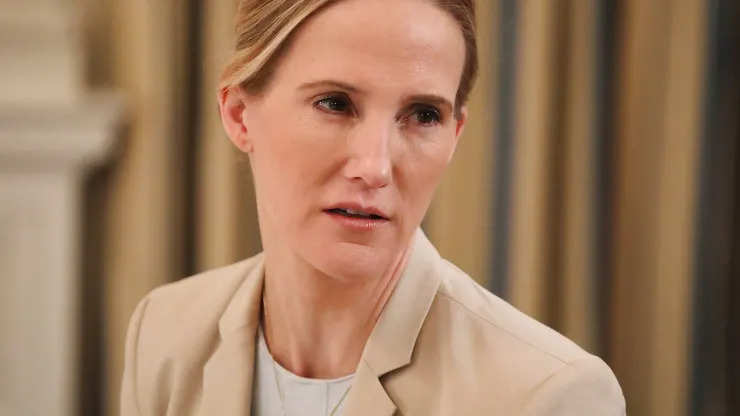[ad_1]
Also in this letter:
■ Venture fund activity picking up in generative AI space
■ Regulating competition issues of IT companies: experts point overlaps in laws
■ Traditional sectors step up tech hiring as IT faces slowdown
ETtech Interview | Expect 20% jump in FY23 revenue, profit but market volatility may hit biz: Zerodha’s Nithin Kamath

India’s largest stock broker, Zerodha is all set to continue its revenue and profit growth by a fifth (20%) in the fiscal year ending March 2023, despite volatility in the public markets globally, triggered by geopolitical conflicts, recessionary fears and interest rate hikes, said founder and chief executive Nithin Kamath to ET in an interview. But there’s a caveat to this growth, which Kamath who is the winner in the Entrepreneur of the Year category at The Economic Times Awards for Corporate Excellence 2022, has been sounding off since last year.
What’s driving the news: According to Kamath, new account openings are already down 50-60% in March 2023 from the all-time highs of pandemic years and 2022 which saw a proliferation of new-age tech IPOs in the country. But if the correction in public markets continues, Zerodha expects its overall revenue growth to be down by almost 30-40% in FY24.
In keeping with its growth trend in the previous fiscal, the Bengaluru-headquartered brokerage is expected to clock total revenue (including interest income) of around Rs 5,956.8 crore and net profit of Rs 2,513.6 crore in fiscal year 2023. These numbers are not audited yet. Zerodha saw its net profit increase 87% in FY22 to Rs 2,094.3 crore from Rs 1,122.3 crore in FY21 and recorded overall income of Rs 4,964 crore for FY22, as reported by ET earlier this year.
Hard talk: “I’m okay with 50% of revenues next year. We all acknowledge that we got lucky to be at the right place and right time when the market expanded.” Admitting that business will be impacted “when the market does a big draw down in terms of participation,” Kamath said that he will not be “forced to make random (changes) to make sure there is no drop in revenues.”

On tech correction: The volatility of public markets has caused new-age tech companies such as direct-to-consumer brand Mamaearth and hospitality major Oyo to go back to the drawing board on their listing plans. Stocks of Indian tech majors such as Zomato, Paytm and Nykaa have dropped sharply from their listing price. “As an entrepreneur it is not what you say at an IPO, but what you say continuously. Because you need to be setting expectations right all the time,” said Kamath. He added that until now (in private markets) what got “rewarded was overselling”.
AMC on the anvil: In 2021, Zerodha received in-principle approval from markets regulator Securities and Exchange Board of India (Sebi) to set up an asset management company (AMC) and is now awaiting a final nod. “There are no new observations, and we are just waiting for the final nod from the regulator. We will launch two to three months after the approval is received,” he said. Kamath has been noticeably clear, in the past, that the AMC will focus on passive products, which increasingly have been taking a pie of overall equity assets in the country.
Venture fund activity picking up in generative AI space

Venture capital firms remain keen on the deeptech sector and its potential to drive innovation and growth, even amid a downturn in startup funding. The accelerating impact of AI across the tech industry is a key driver of this interest.
What’s driving the news: Early-stage venture capital firms pi Ventures and Speciale Invest have secured funding to invest in deeptech and AI startups. Indian startups offering AI or machine learning-based products have so far raised $270 million this calendar year, according to data provided by Tracxn.
Focus areas: According to investors, AI startups can be broadly divided into two categories: those developing and refining their own models, and those constructing application layers that sit atop existing models. Some of the funds ET spoke to are looking for potential bets on startups with proprietary training models, while others are evaluating potential investments in the applied-AI space where companies build on top of large language models like the generative pre-trained transformer (GPT).
Regulating competition issues of IT companies: experts point overlaps in laws

Several overlaps have emerged between current and proposed laws such as the upcoming Digital India Bill (DIB) which will replace the Information Technology Act, the recently passed Competition Act and the Consumer Protection Act, 2019, prompting experts to raise concerns of over-compliance and regulatory overreach.
Details: While experts are requesting the government to step in and create “harmony” between different legislations to ensure clarity and for ease of doing business for tech companies, minister of state for electronics and IT Rajeev Chandrasekhar said recently that the government would eventually take a call on such matters.
What are the overlaps? As per a March 9 presentation by Chandrasekhar, the DIB, which will replace the 22-year-old IT Act, will ensure an open Internet, characterised by choice, competition, and fair market access. The DIB also seeks to regulate fair trade practices, prevent concentration of market power and gatekeeping, and correct distortions through regulation of dominant advertising technology platforms and app stores. Currently, these concerns are being dealt with under Sections 3 and 4 of the Competition Act, which prohibit anticompetitive agreements and abuse of dominant position.
These components also conflict with the Competition (Amendment) Bill, 2023, passed by the two houses of Parliament on March 29 and April 3. Another area where there is an overlap is the Consumer Protection Act, 2019, which also deals with cases of anticompetitive behaviour by businesses, experts said. Currently, the work on the new law, DCA, is also underway that could have potential overlaps with the DIB.
Quote, unquote: “The CCI (Competition Commission of India) is already well-equipped to lead the regulatory space on all aspects arising from market concentration and dominance-related conduct, so is there a risk of over-regulation if the mandate under the DIB and the DCA also encompass these very issues,” said Ravisekhar Nair, partner, at Economic Laws Practice (ELP). The main challenge at this stage would be to determine the most optimal structure and method to implement the planned regulatory schemes, he said.
MPL’s unit Mayhem Studios raises $20 million from Sequoia, Steadview, Truecaller, others

Mayhem Studios, the mobile game development studio launched by Bengaluru-based online gaming unicorn Mobile Premier League (MPL) last year, has raised $20 million in its Series A round led by Sequoia Capital with participation from Steadview Capital, Truecaller and others. Bing Gordon, chief product officer at US-based venture capital firm Kleiner Perkins, has participated in the round in his personal capacity.
About Mayhem: Mayhem Studios was launched to develop AAA mobile games, which are video game titles with big development and marketing budgets. The game development studio competes with several players including Dream11-parent Dream Sports’ Dream Game Studios, Nazara Technologies, and others.
Earlier fundraise: MPL last raised around $150 million at a valuation of $2.3 billion back in September 2021. The company also forayed into web3 gaming and launched non-fungible token (NFT) marketplace Good Game Exchange (GGX) last month to tap into the play-to-earn gaming sector.
JSW One Platforms raises Rs 205 crore from Mitsui: Conglomerate JSW Group on Monday said its technology business JSW One Platforms has secured Rs 205 crore in funding from Japan’s Mitsui & Co, valuing the marketplace at Rs 2,750 crore.
JSW One Platforms will utilise the money to strengthen its market presence and improve its technology. The firm, which houses both business-to-business and business-to-consumer construction ecommerce units, plans to expand operations in newer geographies like Delhi-NCR, Gujarat, Rajasthan, Madhya Pradesh and Chhattisgarh. It will also invest in credit, logistics and technology to improve customer experience.
Tweet of the day
Traditional sectors step up tech hiring as IT faces slowdown

Despite the slowdown and widespread job cuts in the technology sector, non-tech industries are recognizing the value of tech talent and are seeking to recruit them.
What’s the news? Manufacturing companies including automakers are hiring software experts for their research and development centres in India, said staffing firms. Companies across sectors are also hiring experts in large numbers to drive digitisation.
Tech slowdown helping recruiters: As the technology sector faces a slowdown, the intense competition for tech talent has eased and companies are seeing a decrease in outsized salary increases. However, recruiters are benefitting from the slowdown as they are able to hire tech talent at more reasonable rates. For specialised manufacturing R&T and R&D recruitment, hikes for job switches could be as high as 50-60% for mid-level engineers, compared to the current average of 15-10%. Some of this demand is translating into a need to look into new HR policies, for traditional sector companies like manufacturing to match the pay scale offered by technology companies, said TeamLease.
ET Ecommerce Index
We’ve launched three indices – ET Ecommerce, ET Ecommerce Profitable, and ET Ecommerce Non-Profitable – to track the performance of recently listed tech firms. Here’s how they’ve fared so far.
Tamil Nadu bans online rummy, poker with stakes

RN Ravi, the governor of Tamil Nadu on Monday, approved a long-pending Bill seeking to ban online gambling including online rummy, poker including stakes in the state. The Tamil Nadu Prohibition of Online Gambling and Regulation of Online Games Bill, also seeks to regulate online gaming including fantasy sports which may now need vetting by a multi-member committee.
Legal challenge expected: Online gaming firms reacted sharply to the legislation citing previous Court judgements that had classified rummy and poker as games of skill and not chance. Firms will pursue legal recourse in a bid to overturn the ban, they said.
Justice K Chandru, head of the four-member committee that recommended a ban in the first place, also predicted that the legislation will be challenged. He also said that the state may succeed if the companies move the Supreme Court, as games that involve gambling may be banned. He said the committee had only studied rummy in depth for their report and that the criteria to determine which games need to be banned are yet to be put in place but broadly, he said it will be those games “that go beyond being a mere game.”
Other Top Stories By Our Reporters

Govts and social media companies should set teen safety standards together: Meta VP Antigone Davis | Governments across the world should work with social media companies to set the standards for implementation of appropriate boundaries for the safety of children, teenagers and women, Meta’s vice president and global head of safety Antigone Davis said.
ServiceNow appoints Kamolika Gupta Peres as VP and MD for Indian subcontinent | Digital workflow company ServiceNow has appointed Kamolika Gupta Peres as its VP and Managing Director for the Indian Subcontinent. Prior to this, she led Google Cloud’s Enterprise, Midmarket and SAARC business in India. She will be based out of Mumbai and lead ServiceNow’s business teams in India.
Global Picks We Are Reading
■ AI used to make unreal Balenciaga crossovers Morning brew (Morning Brew)
■ In celebration of the dumb phone, a rare sanity-saving gadget (The Verge)
■ The Future Smartphone: More Folds, Less Phone, a Whole Lot of AI (Wired)
[ad_2]
Source link


